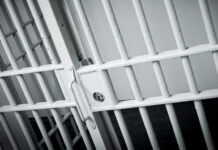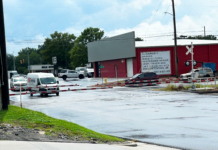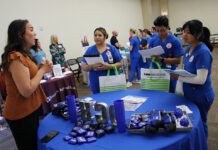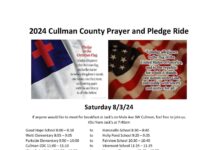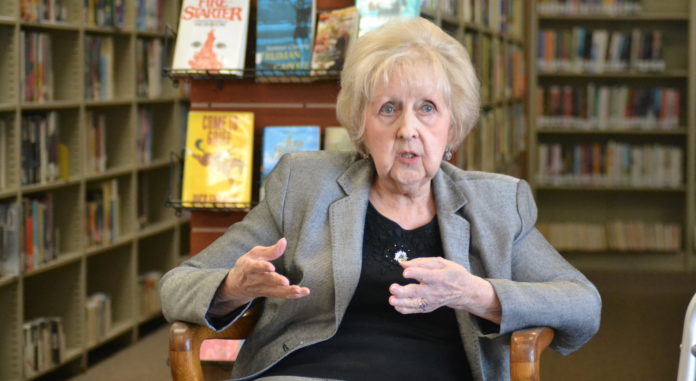
CULLMAN, Ala. – Author Rosemarie Reinhard Musso grew up in the village of Sterbfritz (Hessen), Germany. Wednesday, she spoke to a crowded Cullman County Public Library, greeting those gathered to hear her by saying, “I want to share my story with you about growing up under Hitler.”
Of her homeland, she compared the countryside to “The Sound of Music,” sharing, “Everything was beautiful and serene, but it was chaotic.”
Her father was a dentist in their village during World War II, and Musso said the Nazis took advantage of that. She said her father tried to get around the atrocities the Nazis wanted inflicted on his patients. Prisoners from concentration camps, forced to do hard labor in a nearby quarry, were brought to her father for dental care. Many had vitamin deficiencies and gum disease, which made their teeth fall out. Her father fed them with food he had stored in his basement.
“My father was a dentist and he was the only dentist, except one other dentist came several years later, but for a long time, like 30 years or so, he was the only dentist in our village,” she said. “So, he had a number of people every day, like 80 to 100 patients a day. During the war, the Nazis ordered the Jews to come to my father. They (the Nazis) came to my father and ordered him to pull all the (Jews’) teeth out and forbade him to give any anesthetic.
“My father went in the basement and the Nazis checked out everything because my father was hiding some Jews in our basement. He’d talked to the Jews and he had an assistant and told the Jews to stay in the basement and he’s not going to take them in his practice, he’s going to pull their teeth in the basement. What the Nazis didn’t know- after they left, he had someone go to the basement to give them anesthetic, and that was after the Nazis had left. It was not long, several months my father was doing that, that somebody snitched on him and the Nazis found out what my father was doing. Because of that, he received a letter in the mail. It was a summons, actually. He was supposed to come to Danzig, Germany and he was supposed to be executed.”
Musso tried to relay what it was like growing up in Germany during that time. She was one of eight children, and food was scarce.
“Have you experienced maybe to wake up in the morning and not know if you have any breakfast or anything to eat at all or even wake up at all? This was a daily occasion for us, because with the bombings on a daily basis and the (Nazi) soldiers would come in our house and search every room for weapons and make sure you didn’t have any weapons,” she said. “They confiscated all the guns and everything; that was a frightening experience. We had food rations. There was never enough food with eight children. Could you imagine having to feed eight children? There were a lot of times when I went to school and I was lucky to have a piece of bread to take to school.”
She continued, “My uncle lived in Chicago and occasionally he’d send us a care package. When those care packages arrived, myself and my sisters and brothers, we turned into vultures. We looked in the package and one time I saw a shiny little can in the package and I was real little and skinny. I stuck my hand in the package and grabbed that little can and hid it and I ran upstairs into our attic and I found something to pry it open. Whatever was in it, I started eating it and I thought I died and went to heaven. It was a can of pineapple! I was so scared I stole that can of pineapple from the package, I ran into the garden and took a shovel and buried the can! I was labeled as the ‘pineapple thief.’”
Continuing the story of her father the dentist, Musso shared, “The punishment if he had gotten caught was imprisonment or death. My father pretended to have a disdain for the Jews, but eventually the Nazis found out what he was doing, and that’s why he received the summons to go to Danzig. He had a patient who was a baroness (who was formally a governess in the household of Kaiser Wilhelm). She was very influential; my father went to see her and he showed her the summons he got to be executed. He asked, ‘What am I going to do?’ and she said, ‘Well you know what that means,’ and he said, ‘Yeah, death for me and my family.’ So, he asked if she could help him. She immediately contacted a general that was a personal friend of hers at (Adolf) Hitler’s headquarters about the dilemma and the general issued orders immediately from Berlin to Hanau not to execute my father.”
Despite the general’s efforts, the executions of the Reinhards were set. They were to be hung.
“My father was a prayer warrior, and I know God honored that,” Musso said, “and on the morning of our hanging, the American troops came in our village. The people in our village and patients ran to the troops and went, ‘You have to save the Reinhard family! They’re supposed to be hung this morning!’ And the troops came to our house and saved our lives. When the Nazis saw the American troops were on their way coming up our driveway, they took off!”
Musso exclaimed, “Hitler tried to kill my dad in World War II, and you know something? He lived to be 97!”
On a lighter note, she humorously shared her first experience with an American soldier.
“The first American (I saw) was a black American and he came in our yard. I had never seen a black man before. So, I slowly approached him and I just looked at him. He was smiling and he reached in his pocket and handed me a chocolate bar! I thought, ‘This is it! He’s my buddy now!’ And so, they (the soldiers) were living in a house across from us where they were placed and they became good friends of our family, and life’s just strange. I love the American soldiers; they saved our lives.”
Rosemarie Reinhard Musso moved to Alabama in 1961. She is author of “Father Forgive Them: The Four Laws of Forgiveness.” Visit www.fatherforgivethem.com to find out more.
Copyright 2020 Humble Roots, LLC. All Rights Reserved.

